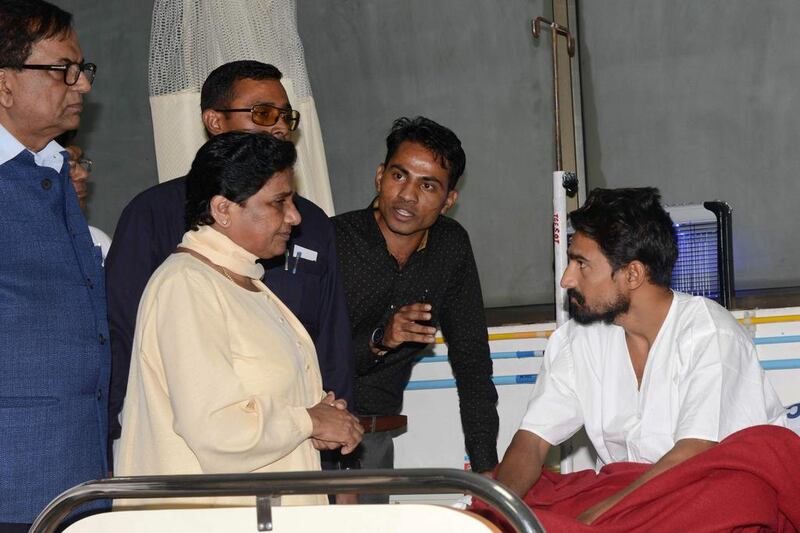NEW DELHI // Prime minister Narendra Modi and his party are rapidly realising how a plank of their Hindu nationalist platform conflicts with their electoral needs.
On Sunday, Mr Modi lashed out at self-appointed cow protectors who have, in Gujarat and other parts of north India, “punished” Dalits who work in tanneries or with cow carcasses.
Taken together with similar remarks made on Saturday, they form Mr Modi’s first public response in nearly a year of such attacks by these so-called cow-protection squads.
Dalits, who occupy the lowest rung in Hinduism’s hierarchy of castes, have traditionally performed the tasks of skinning carcasses or slaughtering unhealthy cows. Since Hinduism regards the cow as holy, these jobs have long been considered “unclean”.
During its election campaign in 2014, Mr Modi’s Bharatiya Janata Party (BJP) included the protection of cows among its promises. In the two years since Mr Modi became prime minister, India has witnessed a number of attacks by vigilante cow protectors.
Most recently, in Mr Modi’s home state of Gujarat last month, four Dalits were flogged for skinning a dead cow. Police arrested five men after a video of the attack went viral on social media.
A wave of Dalit protests that followed prompted the head of the BJP state government in Gujarat to resign last week.
The Hindu right has consistently invoked the religion’s sanctification of the cow to justify or explain the attacks by “gau rakshaks,” or cow protectors. “It’s natural for gau rakshaks to get angry when they see dead or injured cows packed in vehicles, because it’s an emotive issue for them,” said Akhileshwaranand Giri, a Hindu holy man and the head of a cow welfare board appointed by the state government in Madhya Pradesh.
He cautioned, however, that vigilantes “should not take the law into their own hands and should wait for the police to come once they stop such vehicles.”
"The third world war will start over a cow," Mr Giri added, in remarks to the Indian Express newspaper on Monday.
Sanjay Singh, a leader of the Aam Aadmi party, pointed out that many of these attacks against Dalits occurred in BJP-ruled states.
“Ever since the BJP came to power, atrocities against the Dalits have been on the rise,” Mr Singh said.
Mr Modi, who first criticised this spate of “cow protection” attacks on Saturday, reiterated his point on Sunday.
“If you have a problem, if you feel like attacking someone, attack me, not my Dalit brothers,” Mr Modi told BJP members in Hyderabad. “If you want to shoot anyone, shoot me, not my Dalit brothers.”
In an earlier speech the same day, in Medak district in Telangana, Mr Modi had launched into similar rhetoric, saying that “fake cow protectors” were “dividing the nation and should be isolated and punished”.
Mr Modi’s statements hold an acknowledgement to the sheer numerical power that Dalit voters wield in Indian elections.
“The BJP has to make these delicate political calculations,” said Suhas Palshikar, a professor of politics and public administration at the University of Pune. “They want to build an image of themselves as a party that values Dalits, but they also don’t want to distance themselves too much from the core base of the Hindu right.”
Mr Palshikar pointed out that Mr Modi’s appointment of Dalit leaders, such as Ram Vilas Paswan and Ramdas Athavale, to ministerial posts in his government was a sign of the BJP’s attempts to appeal to the caste.
But Dalit voters are more likely to be swayed, in forthcoming state elections, by incidents of violence that seem targeted against them and that appear to have the benign blessing of the BJP and its Hindu-right allies.
Several major states are scheduled to vote for new state governments over the next 12 months. Most prominently, Uttar Pradesh, which goes to polls in the spring of next year, has roughly 40 million Dalits among its population of 204 million.
In total, there are approximately 200 million Dalits in India, nearly all of them still living under the social and economic oppressions of the caste system.
According to the National Crime Records Bureau (NCRB), India witnessed a sharp rise in crimes against Dalits — or scheduled castes, as they are known officially — from 2013 to 2014.
In 2013, there 39,408 cases of crimes against Dalits. In 2014, the most recent year for which data is available, the NCRB recorded 47,064 such cases. A fifth of these crimes were in Uttar Pradesh.
The government-appointed National Commission for Scheduled Castes also reported, earlier this year, that Gujarat witnessed a five-fold increase in crimes against Dalits from 2014 to 2015.
On Sunday, Mr Modi insisted that his government works hard to improve the conditions of Dalits, and that rival parties had a hand in stirring up the controversy over the violence against Dalits.
“Some people are pricked by our welfare programmes for Dalits, as other governments did not do anything, and they are trying to politicise [this issue],” Mr Modi said.
Mr Modi’s remarks struck Mr Palshikar as “too little too late”.
“But this is how the party is playing the game,” he said. “They’ve allowed gau rakshaks to have their run all this time, and now, before these elections, they will try to rein them back and keep things in control.”
ssubramanian@thenational.ae





